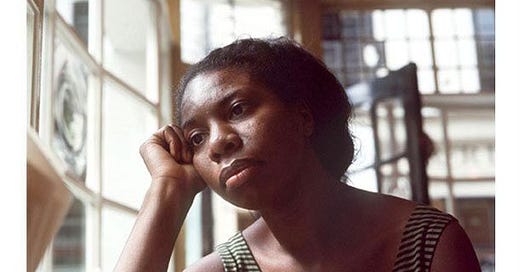sulk
"So it is better to speak remembering we were never meant to survive" - Audre Lorde (from "a Litany for Survival")
I did not think Kamala Harris would become the next president of the United States. For a second, right at the beginning, it looked like she would and I think most of us suffered under this delusion because there were a lot of people paying lip service to “progress” “unity” “democracy” and so on… But I had that inkling, an inkling that my mother formed into words. She said, “she won’t win.” While my initial thought was “mummy is being pessimistic,” her words penetrated my delusion. So when the race got tighter, even after Trump sounded off his nonsense at the one and only presidential debate and generated talks of lunacy, I knew, I knew that Kamala Harris would not be the next president of the United States.
Lip service to movements that garner hopes of progress serve as distractions. We became outraged when Trump and his cronies inevitably said racist/sexist shit. We found hope when Republicans, who previously supported Trump, showed up to Kamala Harris’ rallies and “spoke up”. We became distracted by this charade of good will democracy instead of paying attention to history and actions. So when November 5 rolled around and people were disappointed/devastated. I drank my milky tea and got ready to give my first guest lecture.
Little Girl Blue
As I discussed in my last Substack, I have officially moved to Ontario to begin my PhD in the Art History Department at Queen’s University. My first week was busier than I had anticipated. I gave my first ever guest lecture on Cheryl Dunye’s iconic experimental documentary The Watermelon Woman. I centred my lecture around Black feminist Patricia Hill Collins’ idea of controlling images found in her book Black Feminist Thought: Knowledge, Consciousness, and the Politics of Empowerment (1990). I specifically chose chapter 4: “Mammies, Matriarchs, and Other Controlling Images.” I assigned this chapter to a cohort of Women and Gender Studies students, mostly young white women, who were also studying film. My goal was to talk them through from “margin to center” the real life implications of images such as the mammy/watermelon woman and how Dunye re-defines the mammy/watermelon woman into a dynamic individual in direct opposition to the static image of Aunt Jemima and them.1
Naturally, only 4 out of 16 students watched the movie and I suspect none read the chapter I had assigned because in the midst of my lecturing one student asked if we could talk about something else because she had not read the chapter or watched the movie and didn’t understand why I was only concentrating on controlling images about Black women. She did soften her arrogance with “what about Black men?” probably because I gave her a curious side-eye.
I gave my lecture on November 5th, the day it was made VERY clear that people say one thing and do another in order to appear “progressive” “moral” etc. while espousing their stagnant and putrid traditional values at the kitchen table. But if you squint then you see what I see: few people are taking actions in line with their projected progressive stances. So when on November 5th I gave a lecture to a room full of young hopeful feminists and the inevitable “devil’s advocate” and I witnessed what seemed to be their collective apathy about hearing experiences outside of Tik Tok rage-bait content on politics, I found a calm reassurance in Audre Lorde’s words from “a Litany for Survival”:
I live at the shoreline
standing upon the constant edges of decision
crucial and alone
I cannot indulge
the passing dreams of choice
(my appropriation of her words)
I cannot wait and plead for my turn to speak.
So while people can choose to ignore frightful realities beyond their noses and indulge in that arrogant choice. I cannot/will not lend my voice, my patience, my love, respect, and empathy to anyone else but to those of us that are here but were not meant to survive. I cannot soothe the ego of the neoliberal feminist and their adherence to singular understandings of womanhood and humanity. When they ask me why I think Kamala did not win and I tell my truth they interrupt and challenge me immediately to save their skins and showcase their noble positions of goodness and being the exception. Little do they know that they are showing their amoebic tendencies— simply spineless.
I cannot possibly know what I am talking about, surely.
I speak from the shoreline where I live and watch, everyday, constant abrasive waves of systemic and mundane violence attempt to erode my confidence and drown out my voice. But while I may hold on to an animal caution driven by my lizard brain to seek food, shelter, and water and avoid large predators, I am not a spineless yellow bellied imp wringing my hands and appealing to the moral conscience of those who wish us dead.
It is a jungle out there, but it is not the king of the jungle that you need to watch out for, you need to be more mindful of the creepy crawlies and their inevitable sting.
My knees may knock and threaten to buckle, but from the remains of my drowned out whispers I sound my voice again; I speak.
your Sister Killjoy
(The above photograph of Nina Simone taken in London captures what I love about her, the often misunderstood “little girl blue,” melancholic, vulnerable, bright, sexy, and a brilliant artist)
The term “from margin to center” comes from bell hooks’ book of the same name Feminist Theory: From Margin to Center (1984).




